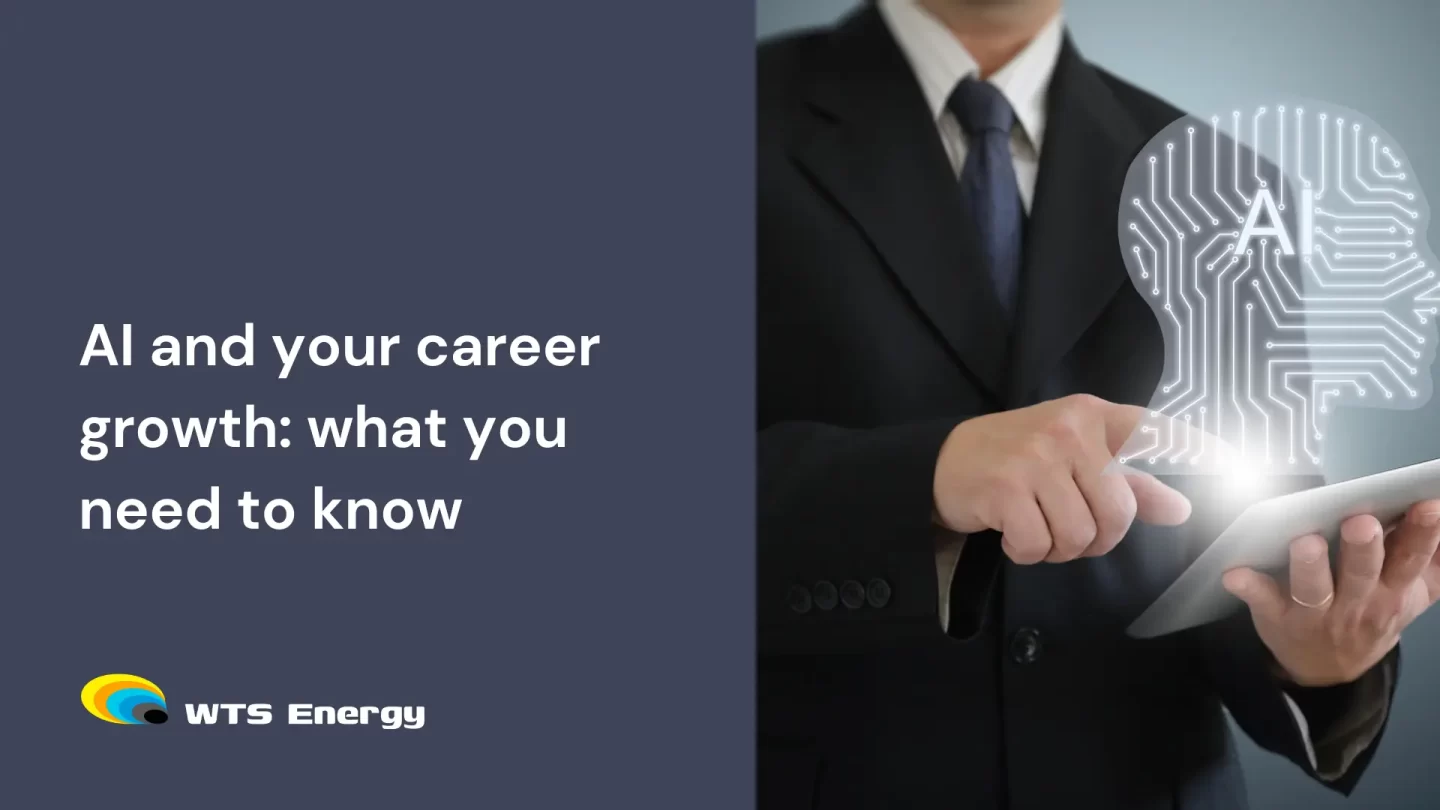Do you think AI is just a buzzword and too far removed from practical applications in energy-related industries? You might have to think about it again. For example, AI is already used in predictive maintenance systems that forecast equipment failures before they happen, saving millions in unplanned downtime. For industry professionals, AI is also a powerful tool for your career growth.
In this article, we’ll look at AI’s impact on the energy industry from two perspectives: industry-wide innovations and individual career opportunities. We will also discuss the potential drawbacks and challenges of integrating AI into your career development. Don’t miss out on this essential insight into what you need to know about AI.

The application of AI in the energy industry
As we said above, AI is transforming the energy sector by addressing complex challenges and driving efficiency in energy sector. According to IEA, AI is making a significant impact in three key areas:
Managing the grids of the future
Power systems are becoming increasingly complex due to rising electricity demand, decarbonization efforts and the proliferation of grid-connected devices such as EV chargers and solar panels. This evolution requires advanced tools, such as AI, to manage data and optimize operations. AI is helping energy companies handle the massive data flows from smart grids, improve efficiency, and support innovation. An estimate suggests that AI already has more than 50 different applications in the energy system, and that the market for the technology in this sector could be worth up to $13 billion.
Driving flexibility by forecasting supply & demand
Renewable technologies face challenges: sunlight and wind are not always available. That’s where AI can play a role in improving predictions of supply and demand. For example, Google’s neural network improves wind power output forecasts, increasing their financial value by 20% and enabling better investment in renewables.
Enhancing reliability and security
AI is transforming energy asset management through predictive maintenance, which monitors and analyses performance to identify faults before they occur. Traditional scheduled maintenance often leads to inefficiencies, but AI uses historical data and real-time monitoring to predict when intervention is needed.
AI Talent Shortage: Challenges and Opportunities in Energy
The energy sector, like many industries, is facing a growing challenge: a significant shortage of workers skilled in AI and machine learning. According to IEA, AI and machine learning have become the fastest-growing occupations globally, but the talent pool remains limited. As of June 2022, there were only 22,000 AI specialists worldwide, while 61% of large companies in the UK and US reported a shortage of staff with sufficient AI expertise. This shortage represents a bottleneck for industries looking to use the potential of AI.
For professionals, this talent gap is an opportunity. Those who invest in AI skills can position themselves as highly demanded candidates, especially in the energy sector where AI applications such as predictive maintenance and energy optimization are rapidly expanding. Companies are increasingly prioritising the upskilling and reskilling of their workforce to fill this gap, and professionals who take advantage of AI training will gain a competitive advantage in their careers.
AI on a personal level: Advancing your career
For personal use AI is no longer a new or innovative concept – it has become a common and essential tool for individuals seeking to improve their skills, optimize their job applications, expand their networks and advance your careers. Here are the common uses of AI in advancing your career:
- Skill Development: AI-powered platforms like LinkedIn Learning and Coursera recommend courses tailored to your career goals, helping you stay competitive in your field.
- Job Applications: Many companies now use Applicant Tracking Systems (ATS) to screen CVs and applications. AI tools can help you tailor your resume to meet ATS requirements. In addition, AI can improve the language, tone and structure of your CV and cover letter, making them more professional and effective.
- Interview Preparation: AI tools simulate interviews, provide feedback on your answers, and suggest improvements, helping you feel more confident and prepared.
- Networking: AI-driven platforms like LinkedIn suggest connections, recommend relevant events, and help identify networking opportunities to expand your professional circle.
Challenges and Considerations of AI
AI is changing industry and our life, but it also brings challenges and considerations. In industries, AI’s energy consumption is a major concern. According to IEA, training a single model can use more electricity than 100 U.S. homes in a year, potentially undermining decarbonization efforts. Efficient algorithms and better energy tracking are needed to minimize its environmental impact.
Accountability is another challenge. Many AI systems used in energy are developed by third parties, leaving operators with limited control over decision-making processes. This raises concerns about trust, especially for crucial decisions like energy pricing or grid management. Efforts like the OECD AI Principles and the EU AI Act aim to create transparency and governance frameworks to address these issues.
On a personal level, over-reliance on AI can lead to generic job applications that lack originality. AI tools may misrepresent skills or produce keyword-heavy resumes that compromise readability. Privacy concerns also arise as users share personal data with AI platforms.
Using AI responsibly – to improve rather than fake skills – is key to maintaining trust and ensuring that AI helps rather than hinders career development.
Conclusion
AI is transforming industries and careers. However, it also brings challenges like over-reliance and energy consumption. What’s your opinion—does AI truly help with career growth, or do its drawbacks outweigh the benefits?
Want to know our consultants’ view? You can read: How is AI transforming our work and life? Insights from consultants



